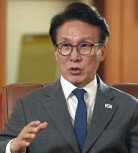A rare opportunity for S. Korea`s initiative toward NK
A rare opportunity for S. Korea`s initiative toward NK
Posted March. 28, 2013 03:33,
In a welcome move, the second-term Obama administration of the U.S. announced will draw up its policy toward the Korean Peninsula based on South Korea`s policy toward North Korea. When the administration started its first term four years ago, it urged North Korea to improve inter-Korean relations first before seeking dialogue with the U.S. As tension escalated after the previous Lee Myung-bak administration tilted its North Korea policy toward pressuring Pyongyang, Washington sought to work its way around to talk with the Stalinist state but was betrayed in the end. The Obama administration, which has been considering a policy shift, has apparently chosen to promote Washingtons alliance with Seoul to support the incumbent Park Geun-hye administrations initiative toward Pyongyang. If the U.S. fully supports North Korea policy of South Korea, it could handle Pyongyangs attempt to pursue direct talks with Washington and ignore Seoul.
The key to the new U.S. policy toward the peninsula will likely be fine-tuned for the last time in foreign minister meetings between Seoul and Washington next month and the first summit between presidents Obama and Park scheduled in May. As South Korea is the first party to peninsula issues, President Park should step up making a blueprint on how to realize her Korean Peninsula "trust process, one of her key campaign pledges. She should not lose this rare initiative toward Pyongyang by failing to devise a concrete policy or an effective strategy.
In a joint briefing to President Park on Wednesday, South Korea`s foreign affairs and defense ministries announced a plan to seek "a path to recovering mutual trust" by providing the North with humanitarian aid, while adhering to the principle of no tolerance of Pyongyangs nuclear weapons development. Critics say the government should not hurriedly seek dialogue with North Korea though the latter has yet to apologize for its armed provocations, and should instead try to prevent a recurrence of the 2008 killing of South Korean tourist at the Norths Mount Kumgang resort by a North Korean soldier. North Korea said Wednesday it will cut a military hotline with South Korea, removing the last remaining means of cross-border communication. The government, however, must not give up efforts for dialogue at least to overcome the latest security crisis and seek a new course in inter-Korean ties. Needless to say, such efforts should be based on solid national security.
After the briefing, President Park said, The fundamental solution is that rather than waiting for North Korea to change, we should proactively seek international cooperation and give the North no choice but to change. She should remember that 10 years of the engagement policy toward North Korea and the pressure used in the past five years were all for nothing because they failed to form a national consensus. Both Koreas cannot implement bilateral agreements and make sustainable peace in just one day. Seoul should achieve its goals step by step.





![[천광암 칼럼]장동혁은 대체 왜 이럴까](https://dimg.donga.com/c/138/175/90/1/wps/NEWS/IMAGE/2026/02/22/133399127.1.jpg)

